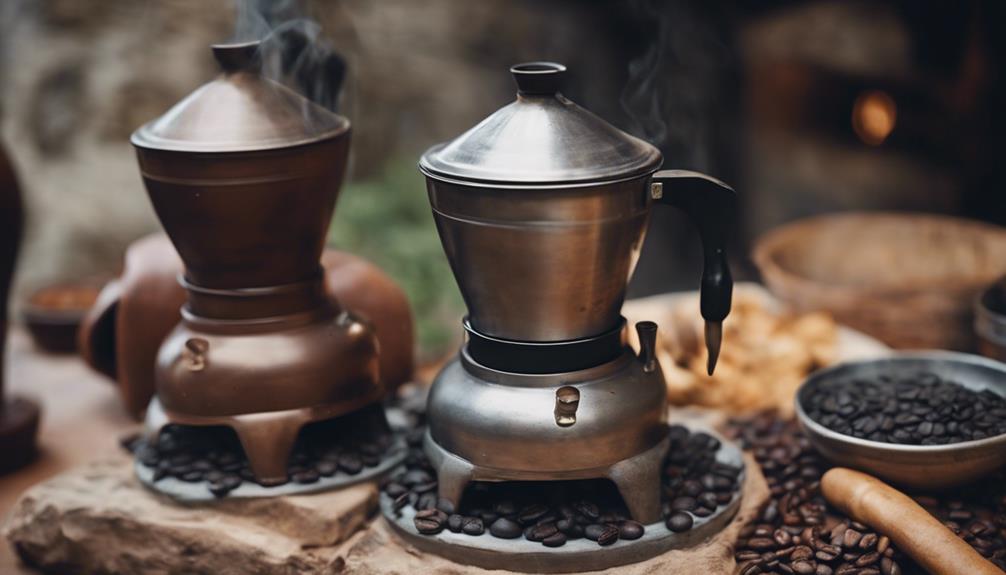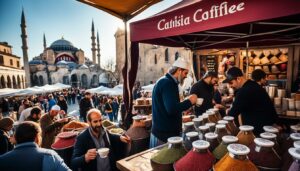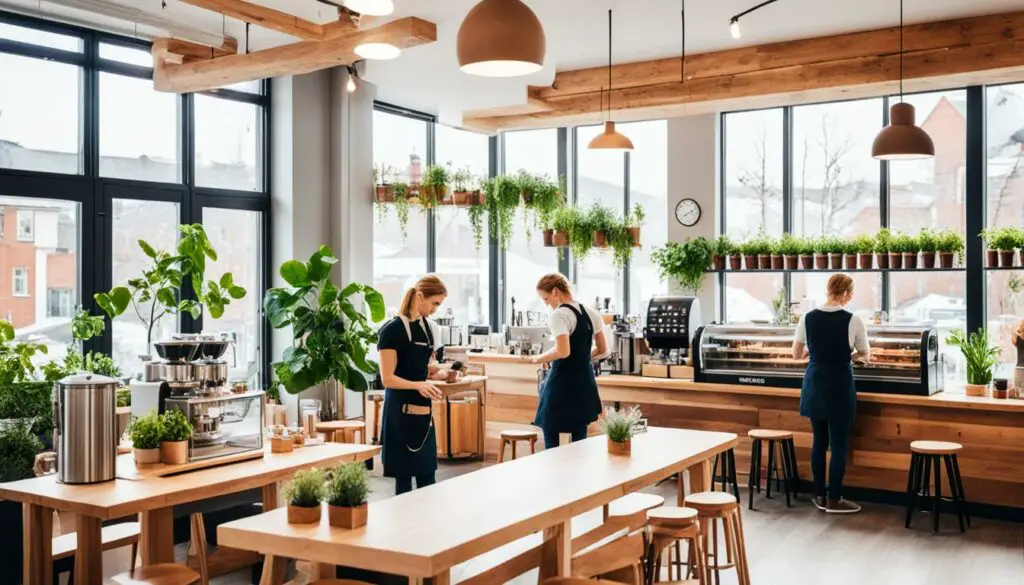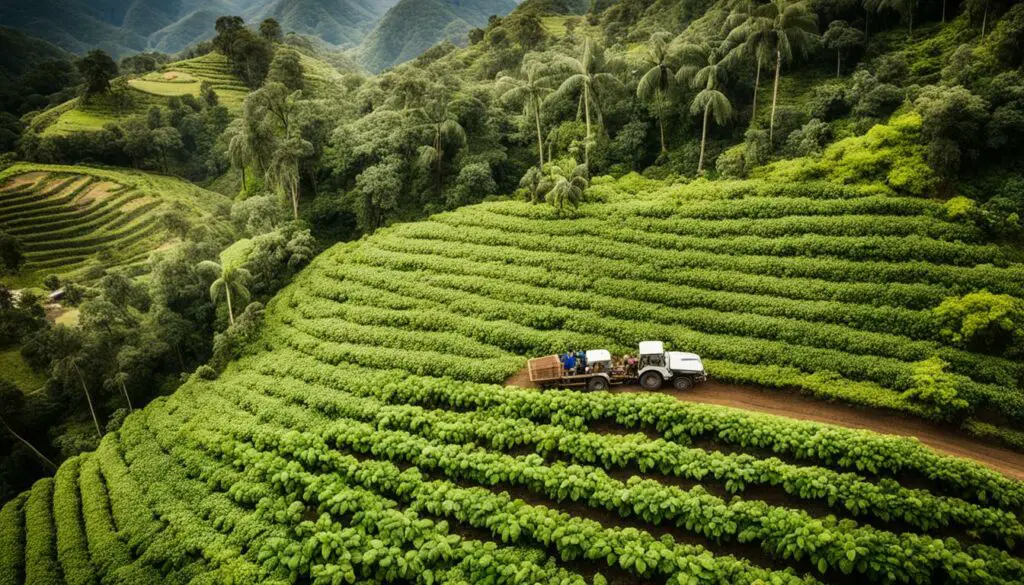Greek and Turkish coffee traditions share a common Ottoman heritage, with subtle differences that make each unique. The main distinction lies in the grind: Greek coffee uses a finer grind, while Turkish coffee opts for a coarser one.
Turks often enhance their coffee with exotic spices like cardamom, whereas Greeks prefer to add sugar during the brewing process. Serving styles also diverge, as Greeks use a 'briki' and Turks use a 'cezve' for preparation.
Despite these variations, both cultures view coffee as a means to connect socially. The contrast between these traditions adds an intriguing layer to the shared love for this aromatic beverage. Join us as we delve deeper into the cultural narratives that bind these two rich coffee worlds together.
Key Takeaways
Both Greek and Turkish coffee traditions have deep roots in the Ottoman Empire and Middle Eastern cultures. Greek coffee is known for its sweetness and smooth texture, while Turkish coffee tends to be grittier and can have a bitter taste without sugar, sometimes infused with spices like cardamom and cinnamon.
When it comes to brewing, both traditions follow a specific coffee-to-water ratio and aim to create a layer of foam on top. However, they utilize different equipment: a briki for Greek coffee and a cezve for Turkish coffee. The presentation is also similar, as both types of coffee are typically served in small demitasse cups, playing a significant role in social gatherings within their respective cultures.
Beyond just a beverage, coffee holds cultural importance in these societies. For instance, Turkish coffee tradition includes the practice of fortune-telling using the patterns formed by coffee grounds in the cup, adding a mystical and intriguing element to the experience. The rituals surrounding coffee consumption in Greek and Turkish cultures contribute to a rich tapestry of traditions and social connections.
Historical Background and Cultural Influences

The coffee traditions in Greece and Turkey have deep roots in the Ottoman Empire and Middle Eastern cultures, particularly in Yemen. These strong and dark brews were introduced to Europe in the 17th century and became integrated into local customs in Greece and Cyprus.
After political tensions in 1974, Greek Cypriots renamed Turkish coffee to Greek coffee, showcasing the drink's ties to regional identities. Arabic coffee influences can be seen in various versions across the Middle East, enriching the coffee culture shared by Greek, Turkish, and Arabic communities.
Despite their differences, these traditions connect through a shared history, culture, and a deep love for coffee.
Brewing Process and Equipment

When brewing Greek and Turkish coffee, the process and equipment used are essential for capturing the distinct flavors and textures of these cherished beverages.
Both traditions follow a similar brewing method with a coffee-to-water ratio of approximately 1:10. However, Greek coffee typically requires a slightly finer grind, while Turkish coffee calls for a coarser blend.
The formation of foam is a crucial aspect observed during the brewing process, adding to the character of the final cup. The brewing vessels differ as well: a briki is used for Greek coffee, while a cezve is the vessel of choice for Turkish coffee, often made from materials like copper, brass, or stainless steel.
Despite these minor variations, the result is always a flavorful and aromatic coffee that reflects the rich cultural heritage of Greece and Turkey.
Ingredients, Variations, and Flavor Profiles

When it comes to Greek and Turkish coffee, the key lies in the ingredients and flavors that create a unique drinking experience. Both traditions use finely ground, dark roasted coffee beans. Greeks prefer adding sugar during brewing, whereas Turks may sweeten it afterwards.
Turkish coffee often includes hints of exotic spices like cardamom and cinnamon, adding depth to the flavor. A common feature in both is the sediment that settles at the cup's bottom. Greek coffee tends to be sweeter and milder, while Turkish coffee can have a slightly bitter taste, especially without sugar.
It's the blend of these ingredients and methods that give Greek and Turkish coffee their distinct and delightful flavor profiles.
Texture, Foam, and Caffeine Content

Texture, foam, and caffeine content are key factors that distinguish Greek and Turkish coffee besides their flavors.
Greek coffee is known for its smoother texture, while Turkish coffee tends to be grittier due to a coarser grind.
Both varieties feature a layer of foam, called 'kaimaki', which enhances the luxurious experience of sipping these traditional brews.
In terms of caffeine content, both types offer a similar moderate level, influenced by the preparation techniques and the dark roast beans used.
The interplay of texture, foam, and caffeine content contributes to a harmonious taste experience unique to each of these coffee styles.
Serving Style, Popularity, and Cultural Significance

Greek and Turkish coffee traditions are distinguished by their serving style, popularity, and cultural significance. Both cultures present coffee in small demitasse cups, but the preparation method sets them apart; Greeks use a briki, while Turks use a cezve. Coffee holds a special place in Greek and Turkish societies, fostering social connections and gatherings with loved ones.
Turkish coffee stands out with the unique practice of fortune-telling using coffee grounds, adding an element of mystique to the experience. Despite any political tensions, coffee serves as a unifying force between these nations, creating a sense of shared heritage. Greek and Turkish coffees go beyond being mere beverages; they're symbols of cultural narratives, steeped in history and tradition, served piping hot in a cup.
Frequently Asked Questions
What Are the Health Benefits Associated With Drinking Greek and Turkish Coffee?"
I enjoy Greek and Turkish coffee for several reasons. They are packed with antioxidants that are beneficial for health, support digestion, and can improve brain function due to their caffeine content. Additionally, the small serving size of these coffees can help regulate caffeine consumption and assist in weight management.
Are There Any Specific Rituals or Traditions Associated With Drinking Greek and Turkish Coffee During Special Occasions or Festivals?"
Greek and Turkish coffee hold significant importance in both cultures, especially during special occasions and festivals. Beyond being a simple drink, it serves as a ritual that brings people together. In Turkish tradition, coffee ceremonies often include fortune telling, adding an element of mystique and excitement to the experience. This cultural practice enhances social interactions and creates memorable moments during celebrations and gatherings.
How Has the Modern Coffee Culture in Greece and Turkey Evolved With the Influence of Global Coffee Trends?"
The coffee cultures in Greece and Turkey have evolved over time, embracing global trends while preserving their unique traditions. Specialty coffee shops are on the rise, yet the traditional methods of brewing and serving coffee continue to hold a special place in the hearts of locals. This blend of old and new in the coffee scenes of these countries reflects a balance between innovation and heritage, creating a rich tapestry of flavors and experiences for coffee enthusiasts to enjoy. The coexistence of modern trends and age-old practices adds depth and character to the coffee culture in Greece and Turkey, making it a truly captivating experience for visitors and locals alike.
What Are Some Popular Accompaniments or Desserts Traditionally Served With Greek and Turkish Coffee?"
When enjoying Greek coffee, it's common to pair it with a piece of baklava or koulourakia. Turkish coffee, on the other hand, is often served with a sweet treat like Turkish delight or a slice of revani cake. These traditional desserts complement the strong and rich flavors of the coffee, creating a delightful experience for your taste buds.
How Does the Coffee Industry in Greece and Turkey Contribute to Their Respective Economies?"
Both the Greek and Turkish coffee industries play a significant role in boosting their respective economies. They create employment opportunities, attract tourists, support local cafes and businesses, and contribute to the global coffee trade. This economic impact is vital for the overall growth and sustainability of both countries, showcasing the importance of the coffee sector beyond just a beverage.
Conclusion
As I conclude my journey delving into the Greek and Turkish coffee cultures, it's evident that these traditions are deeply rooted in history yet distinctly unique.
The rituals surrounding coffee in these societies are more than just routines; they form the pulse of their communities. A cup of Greek or Turkish coffee isn't a mere beverage but a gateway to a profound cultural experience that leaves a lasting impact on the individual.
Each sip tells a story of tradition, heritage, and a way of life that transcends borders and time, making it an essential part of the cultural tapestry of these nations.












